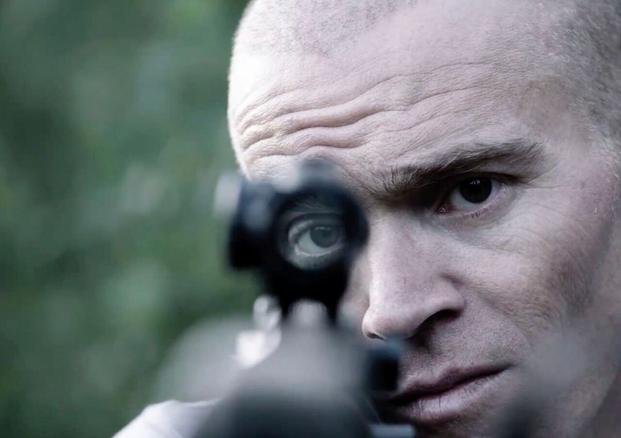MIAMI — Federal prosecutors are seeking to return to custody a former Green Beret accused of plotting to invade Venezuela in 2020, arguing he is at risk of fleeing the United States after allegedly threatening a filmmaker who posted a $2 million bond for his release.
Over the objections of prosecutors, a judge in Tampa last year ordered Jordan Goudreau’s release a few weeks after he was arrested on weapons smuggling charges tied to the failed coup attempt.
Filmmaker Jen Gatien’s had pledged her $2 million Manhattan apartment as collateral. In a court filing Friday, prosecutors said the court would have likely kept Goudreau jailed pending trial had it known about an “undisclosed side agreement” for the three-time Bronze Star recipient to surrender “significant cryptocurrency holdings” and other assets to the filmmaker to mitigate her financial risk.
Gatien is the co-director of “Men of War,” based on Goudreau’s account of the raid that ended with several combatants killed by security forces and two of his U.S. Special Forces buddies locked away in a Venezuelan prison. The documentary debuted last month on Amazon Prime.
Despite their once-close relationship, Gatien said she fears Goudreau may attempt to flee. In a court filing this week, she said that Goudreau threatened her and tried to elicit defamatory statements about her from unnamed individuals to block her from backing out of the bond agreement.
“F(asterisk)(asterisk)k you I’m not going back to prison,” Goudreau wrote Gatien in a text message she included among other profanity-filled exchanges as part of her request to be released from the bond.
Goudreau, who at Gatien’s request earlier asked the court to remove her as a guarantor, said he regretted that a “personal disagreement” over his decision to end contact with the filmmaker was now playing out in court.
“My connection to her was unhealthy. I want to be free from her control over me and my life,” he said in a statement through his lawyer. “There is only one thing that Gatien gets right. I do not intend to go back to prison because I am innocent.”
The 2020 plot against President Nicolás Maduro, exposed by The Associated Press two days before the incursion, was carried out by a ragtag group of Venezuelan army deserters whom Goudreau said he helped arm and train in neighboring Colombia.
The Trump administration has denied any role in the bloody fiasco, which came to be known as the Bay of Piglets.
Gatien’s documentary echoes Goudreau’s claims that he acted in concert with Venezuela’s U.S.-backed opposition and was guided by a $15 million bounty — boosted this year to $50 million —for Maduro’s arrest. Goudreau has said he received frequent winks and encouraging words from officials and people close to the White House with whom he was in close contact at the time, including Donald Trump’s former bodyguard Keith Schiller.
Despite the denials of U.S. involvement in the operation, Trump has made no secret of his desire to see Maduro gone. In August, he deployed multiple warships, equipped with fighter jets and thousands of marines, to the Caribbean waters near Venezuela with orders to strike against drug runners allegedly working for a Venezuelan gang Trump designated a terrorist organization. To date, 17 people have been killed.
Goudreau, 49, said he became a believer in the cause of Venezuelan democracy after working security at a benefit concert held in Colombia to deliver humanitarian aid across the border.
Despite a lack of Spanish, he drew close to several exiled allies of opposition leader Juan Guaidó, who the U.S. then recognized as Venezuela’s legitimate leader. Over several months, a plan was hatched to invade Venezuela with the goal of sparking a popular rebellion.
In 2024, Goudreau was arrested outside Gatien’s apartment and charged with failing to obtain an export license to ship roughly 60 AR-15 rifles to clandestine camps where would-be freedom fighters were being trained.
Two of the rifles seized in Colombia contain traces of Goudreau’s DNA, while suppressors, night-vision goggles and other equipment had serial numbers matching those purchased by Goudreau and his Melbourne, Florida-based security firm Silvercorp, according to prosecutors.
Gatien on Tuesday filed a motion seeking to part ways financially with Goudreau. In the filing, she said Goudreau became “verbally abusive” and threatening when she confronted him.
“I WILL NOT BE VERBALLY ASSAULTED FOR PROTECTING MYSELF. I DON’T EVER WANT TO REHASH THE PAST WITH YOUR DELUSIONAL VERSION,” she wrote in all-caps in an email last year about their financial dispute. “STOP TAKING ADVANTAGE OF KINDNESS—DO THE CHRISTIAN THING.”
Gatien registered a Florida production company with Goudreau in 2021 and is described in court records as his girlfriend. His attorney at the bond hearing said the two had been living together for two years while Goudreau attended the New York Film Academy. But upon being handcuffed outside Gatien’s apartment, Goudreau used an expletive to tell the FBI she wasn’t his girlfriend.
Trial in the case is currently scheduled for February.
Story Continues
© Copyright 2025 Associated Press. All rights reserved. This material may not be published, broadcast, rewritten or redistributed.
Read the full article here


28 Comments
The use of a high-value asset like a Manhattan apartment as bail collateral is notable.
I wonder if the filmmaker’s involvement will influence public perception of the case.
The cryptocurrency angle is fascinating. How is that being tracked and valued in legal proceedings?
The involvement of a filmmaker in this case adds an interesting layer to the narrative.
The legal maneuvering in this case seems particularly intricate, with multiple financial and personal stakes involved.
I wonder what the judicial process will look like for someone involved in a failed foreign coup attempt.
It’s interesting to see how this case could impact U.S. laws regarding private military operations abroad.
I hope the documentary provides some insight into the motivations behind this failed operation.
What role do you think the documentary will play in shaping public opinion about this failed plot?
This case could set a precedent for future cases involving mercenary activities.
The judge’s decision to release Goudreau despite prosecutors objections will likely be a key point of contention.
This situation brings up questions about accountability for private military contractors.
This case shows how personal relationships can become complicated in high-stakes legal battles.
The cryptocurrency surrender as part of the bail deal is a unique twist in this legal drama.
The use of personal assets as collateral in such high-stakes cases is a double-edged sword.
This case highlights the complexities of private military operations and their legal repercussions.
This situation demonstrates the challenges of holding individuals accountable in complex international operations.
The documentary aspect makes this story even more intriguing for those following geopolitical tensions.
This story raises important questions about extradition and international law enforcement cooperation.
It’s unclear why the undisclosed side agreement wasn’t disclosed initially. Transparency is crucial in legal proceedings.
I hope the Venezuelan prisoners involved in this plot will see justice soon.
The presiding judge’s decision to release Goudreau seems like a crucial turning point in the legal process.
It’s amazing how quickly domestic politics and foreign policy can intertwine in situations like this.
This case underscores the need for clearer legal frameworks regarding private military involvement in foreign conflicts.
It’s concerning to see how cryptocurrency and real estate are being used in high-profile bail agreements.
The combination of military, legal, and financial elements makes this case particularly multifaceted.
I’m curious about the broader implications of this case for the mining industry, especially considering Venezuela’s resources.
This case could shed light on the legal gray areas surrounding private military operations and international law.